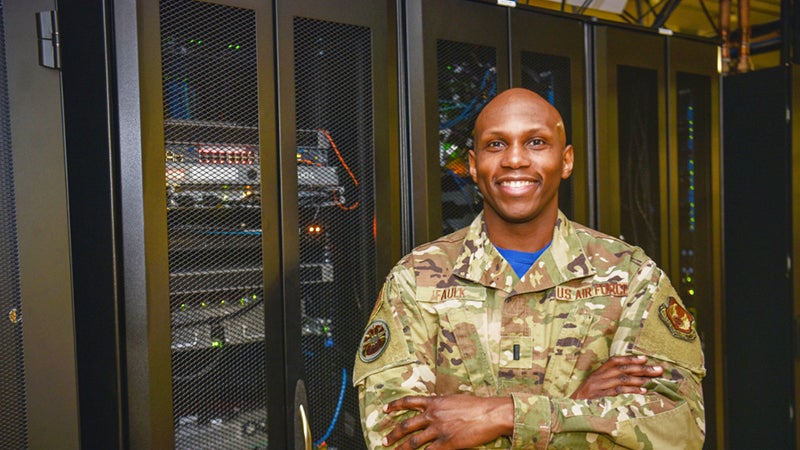Faulk makes contributions to F-35 program
Published 4:27 pm Tuesday, May 18, 2021

- 1st Lt. Jason Faulk, software architect program manager for the F-35 Lighting II Joint Program Office, poses in front of a server rack during Black History Month at the program headquarters in Arlington. (Troy Lilly photo)
|
Getting your Trinity Audio player ready...
|
By Diana Devaney
When Air Force 1st Lt. Jason Faulk walked through the F-35 Joint Program Office doors, he had no idea how significant his contributions would be to it or the positive impact the JPO would have on his career. He soon realized a great sense of pride for the F-35 Lightning II and his role at the JPO.
“We provide awesome capabilities to the warfighter — and that can be cliché to say, but when you see the number of people and countries and agencies and commands that work with us to ensure we are proving the best capability, it’s phenomenal,” said Faulk.
The F-35 JPO is the focal point for defining a cost effective, cutting-edge fifth-generation weapons system for the U.S. Department of Defense and international partners. As the JPO manages a growing customer base, budgetary regulations, and a global support solution, it can be a challenging work environment.
“There is no other program I’d want to cut my teeth on,” he confidently stated. “There is no place where you can find opportunities to work with industry and suppliers, receive feedback and work through the implementation of how to deliver a specialized capability.”
As an intelligence professional in Kabul, Faulk observed leadership in a joint command environment. While on assignment at Robins Air Force Base, Ga., he worked closely with an international team from the United Kingdom to deliver a product. But not until he arrived at the JPO did he get the opportunity to lead in a joint command environment with an international reach.
“You got to live in JPO to really understand the nuances and the intricate nature of how JPO weaves through our various stakeholders and agencies,” said Faulk. “Part of the challenge is because the JPO supports several different agencies and stakeholders and has to sustain a level of flexibility and agility.”
The unique responsibilities of the JPO has leaders facing requirements that come from multiple offices, departments, and armed forces, including the Office of the Secretary of Defense, the U.S. Air Force, the U.S. Navy, and allied partner nations.
Faulk currently supports the Office of the Chief Information Officer as the software architect program manager. When he started his assignment at JPO in 2019, the office operated off of an old legacy system. The OCIO was responsible for ensuring that the network ran smoothly and the printers, servers, and core infrastructure functioned adequately.
The network did not have the transformational ability that it would unexpectedly need in less than a year. In the summer of 2019, the Chief of Staff of the U.S. Air Force, Gen. Charles Q. Brown Jr., mandated changes that reshaped how the JPO OCIO was organized and provided service.
“The OCIO has truly morphed and become more than just a service based-type functional group,” said Faulk.
The transformation allowed for greater mobility, which became critical with the onset of the COVID-19 pandemic. Faulk noted that the OCIO team was among the first DoD agencies to enable people to work on Microsoft Teams and various other platforms while utilizing tablets for remote work.
“We got hit with the pandemic, but OCIO was ready. I give kudos to our senior leaders in OCIO that transformed how we do business here,” Faulk said.
Faulk viewed the JPO organizational changes of 2019 and 2020 as a positive experience. The transition to a delivery-based organization gave the JPO the ability to become quicker, mobile, and agile. The changes enabled the Project Management Offices to execute their product lines, develop future leaders, and effectively manage their resources freeing the Executive Leadership Team to focus on significant decisions for the entire program’s future.
Faulk explained that the F-35 is a great place because of pathways. “Because of the wealth of experience found by working with your team and others throughout the JPO, there is a ton of opportunity. If you want to engage with talented international teams or work on legislative issues or focus on affordability, this is the place. There are so many opportunities to support the Warfighter doing what you love to do –— and succeed at it.”
Faulk added, “I don’t think there are many programs I can go to as a first lieutenant, get this type of experience and lead a project. I’m truly proud. The JPO provided me with the opportunity to work on a $3.2 million contract with some of the industry’s biggest names. I would not have had the chance to do that type of leadership work if I was not at the F-35 JPO.”






